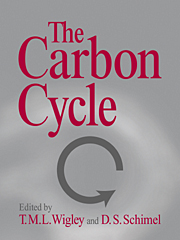Book contents
- Frontmatter
- Contents
- Preface
- Acknowledgments
- Contributors to the 1993 Global Change Institute
- I INTRODUCTION
- II THE MISSING CARBON SINK
- 3 Carbon Dioxide Emissions from Fossil Fuel Consumption and Cement Manufacture, 1751–1991, and an Estimate of Their Isotopic Composition and Latitudinal Distribution
- 4 Emissions of Carbon from Land-Use Change
- 5 The CO2 Fertilizing Effect: Relevance to the Global Carbon Cycle
- 6 Soils and the Global Carbon Cycle
- 7 Grasslands and the Global Carbon Cycle: Modeling the Effects of Climate Change
- 8 Constraints on the Atmospheric Carbon Budget from Spatial Distributions of CO2
- 9 Estimating Air–Sea Exchanges of CO2 from pCO2 Gradients: Assessment of Uncertainties
- 10 Atmospheric Oxygen Measurements and the Carbon Cycle
- 11 A Strategy for Estimating the Potential Soil Carbon Storage Due to CO2 Fertilization
- III PALEO-CO2 VARIATIONS
- IV MODELING CO2 CHANGES
- Part V Appendixes
- Index
8 - Constraints on the Atmospheric Carbon Budget from Spatial Distributions of CO2
from II - THE MISSING CARBON SINK
Published online by Cambridge University Press: 04 December 2009
- Frontmatter
- Contents
- Preface
- Acknowledgments
- Contributors to the 1993 Global Change Institute
- I INTRODUCTION
- II THE MISSING CARBON SINK
- 3 Carbon Dioxide Emissions from Fossil Fuel Consumption and Cement Manufacture, 1751–1991, and an Estimate of Their Isotopic Composition and Latitudinal Distribution
- 4 Emissions of Carbon from Land-Use Change
- 5 The CO2 Fertilizing Effect: Relevance to the Global Carbon Cycle
- 6 Soils and the Global Carbon Cycle
- 7 Grasslands and the Global Carbon Cycle: Modeling the Effects of Climate Change
- 8 Constraints on the Atmospheric Carbon Budget from Spatial Distributions of CO2
- 9 Estimating Air–Sea Exchanges of CO2 from pCO2 Gradients: Assessment of Uncertainties
- 10 Atmospheric Oxygen Measurements and the Carbon Cycle
- 11 A Strategy for Estimating the Potential Soil Carbon Storage Due to CO2 Fertilization
- III PALEO-CO2 VARIATIONS
- IV MODELING CO2 CHANGES
- Part V Appendixes
- Index
Summary
Abstract
Extensive sampling networks have been established to determine the space–time distributions of greenhouse gases so that these data can be used to provide information about the sources and sinks. However, the problem of deducing sources and sinks from concentration data is an ill-conditioned (and often underdetermined) problem and as such is subject to large amplification of errors in observations or models. Various techniques that have been introduced to address this problem are reviewed. Particular attention is given to techniques of Bayesian synthesis inversion that can provide estimates of the uncertainty for the sources that are deduced.
The Context
The atmospheric budgets of radiatively active gases such as carbon dioxide (CO2), methane (CH4), and nitrous oxide (N2O) remain subject to very considerable uncertainty. This uncertainty exists despite a wide range of observational and theoretical approaches that have been used in attempts to resolve the ambiguities. One particularly important approach has been to estimate the strengths of the various source and sink processes by using trace gas concentrations from global sampling networks. The principle is that the spatial distributions of concentrations constrain the spatial distributions of sources and sinks. These constraints in turn imply constraints on the possible source and sink processes.
In principle, determining sources and sinks from the spatial distributions of trace gas concentrations (technically called inversion) provides a “snapshot” of the distribution of sources, regardless of the processes that produce the sources.
Information
- Type
- Chapter
- Information
- The Carbon Cycle , pp. 115 - 124Publisher: Cambridge University PressPrint publication year: 2000
Accessibility standard: Unknown
Why this information is here
This section outlines the accessibility features of this content - including support for screen readers, full keyboard navigation and high-contrast display options. This may not be relevant for you.Accessibility Information
- 1
- Cited by
